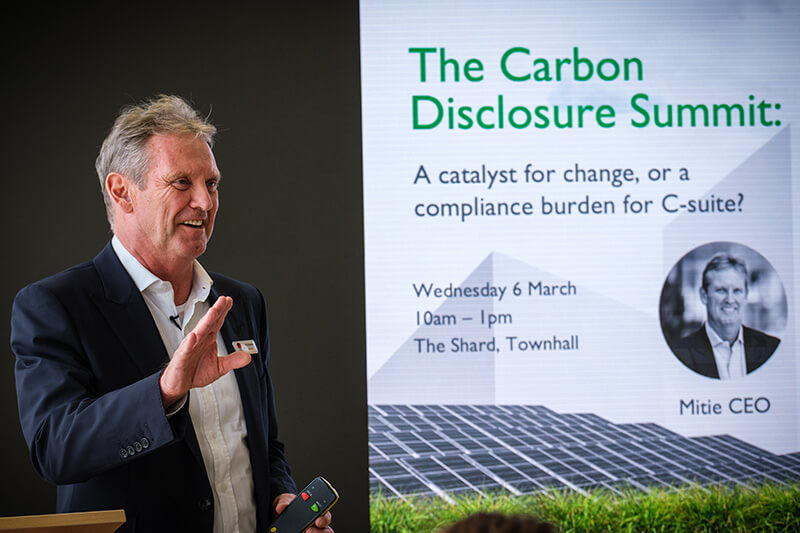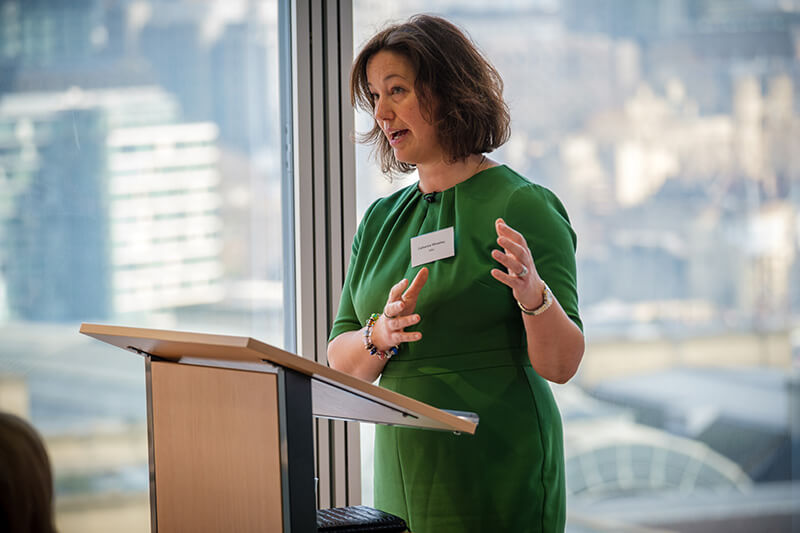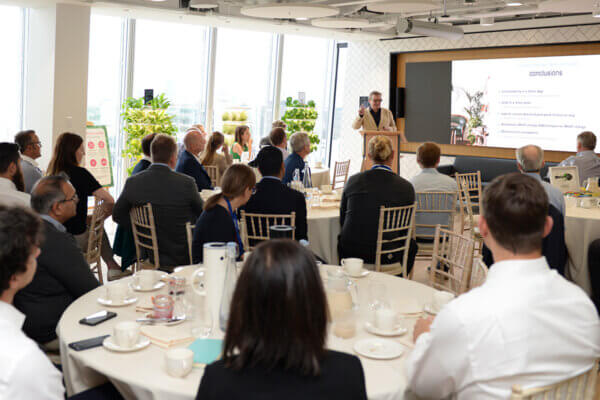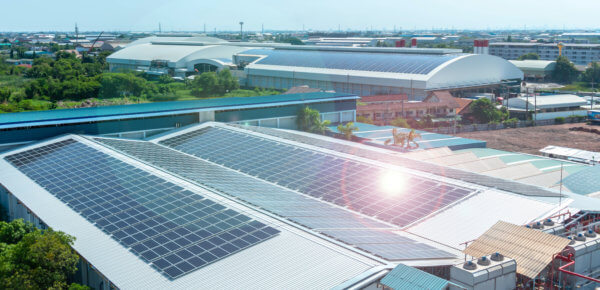Make sure CO2 accounting adds up
Is new carbon reporting legislation a catalyst for change or a compliance burden for the C-suite?
This was the hot topic at Mitie’s recent Carbon Disclosure Summit, which welcomed leaders from public and private sector organisations to our headquarters in The Shard.
The answer was loud and clear – carbon reporting should be a catalyst for positive change.
And with the following event summary and insights, you can make sure this is the case at your organisation.
The rate of change in today’s world will never be so slow again.

This is how tech author, expert and founding Editor-in-Chief of Wired UK, David Rowan, explains why he believes new carbon reporting legislation presents a massive opportunity.
Because as organisations dig into their CO2 emissions and find untapped opportunities, the accelerating pace of technological innovation means they can effectively seize such opportunities as they arise.
Exponential advances
For proof David told the audience of the Carbon Disclosure Summit to look no further than the falling cost of solar power.
He said: “Almost 50 years ago the cost of one watt generated via solar PV was $100. Skip forward to today and the cost is pretty much free.”
A similar advance in technology accompanied by an exponential decline in cost is evident in DNA sequencing.
So, David encouraged organisations to get carbon reporting on track and tap into the lucrative opportunities offered by the technology of tomorrow.
He said: “What’s happening in science, renewable energy and AI will only get faster… All the scientific ideas that haven’t yet become trillion dollar opportunities; some of them are going to be… Embrace it and stay optimistic.”
Not if, but how?
During the Summit Q&A, attendees made clear their organisations wished to grasp opportunities that bring environmental and financial benefits, but were often unsure how to do so.
In his welcoming speech, Mitie CEO, Phil Bentley, revealed research backs this up – many leaders are frustrated and struggling to account for carbon emissions appropriately.

Phil said: “No-one here can afford to fall behind… 78% of C-suite and ESG leaders responding to our research said their current ESG reporting arrangements are inefficient and burdensome.”*
Three Cs of carbon reporting
Mitie’s Head of Data and Technology, Catherine Wheatley, further explored the circumstances faced by many organisations.
Three common themes emerged during her presentation.
Challenges
Catherine said: “The first challenge is data and efficiency. Carbon accounting and reporting is resource intensive with a need to process vast amounts of data from different sources and formats before we start to generate that insight.
“Secondly, skills shortages. We are facing both an overall skills and resourcing shortage with 77% struggling in this regard, but also skills gaps in particular areas, especially around data and insight.
“Thirdly, changing legislation, with over half of people in our survey thinking legislation will become more stringent in the next three years, they are concerned about how they can keep up.”
Change
Getting to grips with the new legislation is critical and Catherine summarised the key changes:
The number of organisations required to report carbon emissions is increasing.
The information required for carbon reporting is becoming more detailed – and in some cases organisations will have to state how they are reducing emissions.
There is a confusing reporting landscape to navigate, with different bodies having different expectations.
Catherine said: “In a world where you must give all these different pieces of information to comply with different bodies, you need to be able to use your data efficiently and cut it in different ways to satisfy different reporting requirements.”

Complexity
Catherine went on to explain how the demands of compliance are heightened by the requirement to account for scope 3 emissions.
She said: “Scope 3 emissions are caused by the value chain that businesses could not run without. These include suppliers, business travel, waste and employee commuting. Right now, Mitie’s carbon footprint is around 22,000 tonnes for scope 1 and 2, but 300,000 tonnes for scope 3 – that’s 13 times more. To tackle that it means engaging with thousands of suppliers across Mitie’s supply chain… It is scope 3 where we see the legislative requirements increasing – and where the biggest opportunity is.”
Make sure carbon disclosure is a catalyst for change
The event culminated with the announcement of Mitie’s new end-to-end carbon reporting solution, Emissions Intelligence, in partnership with Salesforce.
By using data gathering, together with our in-house decarbonisation expertise, it helps organisations meet regulations, reduce costs, increase efficiency and move towards net zero.
And to further support emissions reduction and reporting, Mitie shared a four-point plan that Emissions Intelligence customers can apply to advance their strategies:
1. Baseline emissions
We use a combination of sensor technology and data gathering expertise to collect scope 1, 2 and 3 emissions data across your entire estate.
2. Account and report
Mitie’s solution automates in-year and annual accounting and reporting across greenhouse gases, waste, water circularity and Environmental and Emissions Monitoring System (EEMS). The reports it generates account for emissions across supply chain and even include insights into social and governance performance.
3. Track and monitor
Track and monitor your emissions and benchmark your progress against your peers down to a departmental level in the customisable dashboard. And perform what-if analysis on your decarbonisation initiatives.
4. Develop strategies to reduce carbon and optimise performance
Easily visualise net zero transition plans from baseline to current year and target date. All reduction plans can be regularly updated according to any changes in your strategy to feed back into ongoing reporting.
Find out more…
In his concluding thoughts, Mitie’s Director of Plan Zero Consulting, Alex Avila, emphasised the importance of a strategic but positive approach.
He said: “The time we are in is critical. There is urgency, but it isn’t too late to implement a successful carbon reporting strategy. It shouldn’t be seen as a burden – it’s an opportunity.”
For a thorough breakdown of carbon reporting legislation and how it will impact your organisation, plus more on Mitie’s new carbon reporting solution, read Emissions Intelligence: Built for Net Zero.
*Source: Mitie Carbon Reporting Study, January 2024
Measure, report and reduce carbon emissions with ease
Learn more about how Mitie can help you simplify carbon collection, reporting and reduction – and take the next step on your net zero journey with confidence.
Fill out our form and our experts will be in touch soon.
Read next
Legislation lethargy hits UK organisations as volume and intensity of sustainability reporting increases
A new survey from Mitie, the UK’s leading facilities management and transformation company which helps organisations to decarbonise their built environment, has found that UK organisations are feeling overwhelmed by the strain of sustainability…

Five key insights to unlock estate optimisation
Learn how to propel your organisation closer to net zero. Urgent action is needed if the UK is to reduce carbon emissions by 45% by 2030, in line with Government commitments. In his opening…

Build a decarbonisation business case that speaks volumes
Building a credible business case for decarbonisation matters – but how do you articulate it to senior decision makers? Plan Zero Director, Mike Sewell, explains. There’s no way around it – decarbonisation must become…